Full Guide for Dew Point Measurement in Industry
The Dew Point is the lowest temperature at which water vapor is allowed to remain in a gas without condensing into a liquid state.
As the temperature of air or gas drops, its ability to absorb water vapor decreases until it is fully saturated and below the dew point
temperature and water droplets will begin to form.
First, What is the Impact of Dew Point ?
In pressurized systems such as compressed air distribution networks, dew point is directly related to temperature and system
pressure. As the pressure increases, so does the dew-point temperature, meaning that the potential for vapor condensation
occurs at higher temperatures.
In practice, this may mean that rather than the condensation temperature being very low, the dew point temperature may be
equal to or higher than the ambient temperature.
Second, Why is Dew Point Measurement Needed ?
Industrial compressed air and gas systems may be damaged by water contamination either directly or through subsequent
freezing and expansion of water.
Air or gas containing water vapor can also affect the process or product quality. Removal of water contamination through
filters and drying systems is common practice, but the risk of damage varies across the plant as dew point (and potentially
damaging condensation) varies with pressure.

ISO 8573-1 defines a series of purity levels for compressed air, including water, measured in terms of pressure dew points.
ISO 8573-3 is the part that defines the method of humidity measurement and ISO 8573-9 method of liquid water measurement.
Third, How to Measure Dew Point ?
Dew point measurement is a simple process and should be monitored continuously in accordance with plant risk
analysis recommendations.
This needs to be done at drying plants in front of the distribution network and at critical use points.
By measuring the dew point, effective control of the drying/filtration system can be achieved to optimize the operating
cost of the compressed air/gas system.
The HENGKO 608 dew point transmitter is ideal for measuring low humidity or humidity in harsh conditions such as
low temperature and high temperature or high pressure. Under these conditions, dew point sensors will provide better
accuracy and reliability than humidity sensors.
So Whether your dew point condition is -60℃ or 60℃, the 608 series products are available for your use.
For Dew Point Measurement, What HENGKO Can Do For You ?
HENGKO has been deeply engaged in the field of temperature and humidity for many years, and the dew point products
are carefully designed so that they can run perfectly in almost any application. The series is designed for compressed air,
industrial dryers and other applications.
Different models of the 608 dew-point transducer are available for different applications. The 608A and 608B can be
used in piping, air compression systems, etc. They are portable and compact for easy installation.
Monitoring dew point is a key indicator of system health and can be used to guide maintenance tasks and to maintain
plant compliance with purity levels set in ISO 8573-1.
In addition to portable compressed air dew point gauges, 608B and 608C dew point gauges are more suitable for
measuring dew points deep inside pipes, and long rods can be customized to length.
Special emphasis should be placed on any part of the system where pressure increases or ambient temperature decreases,
as these situations can quickly become problematic. For example, an air ring main leaves one building for another and the
external ambient air is significantly lower or may be significantly lower than the indoor environment. Additional drying capacity
may be required and monitored to prevent condensation as pipes leave the building.
Contact us if like to know more about Dew Point Measurement.
Send your message to us: